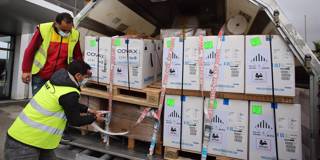While the United States and other rich countries in the Global North start to administer COVID-19 vaccination boosters, only 8.5% of African adults have received one dose of vaccine. Immediate and sustained action is needed both to close the vaccination gap and to reverse a dangerous global health-care divergence.
JOHANNESBURG/LONDON – For the past 30 years, everyone assumed that developed and developing economies were converging, with higher growth rates in Africa and elsewhere helping those countries to catch up. But African economies are now growing at only half the average global rate. Divergence is becoming the new order of the day. And with growing fiscal pressures, increasing debt, mounting inflation, rising interest rates, and supply-chain disruptions creating new barriers to growth, it is almost certain to get worse in 2022.
This outcome is not inevitable, but the only way to reverse it is to extend the benefits of vaccination and other medical protections from the Global North to the Global South. As we write, only 8.5% of African adults have received one dose of COVID-19 vaccine. Of the 6.9 billion doses that had been administered globally by mid-October 2021, only 176 million (just 2.5%) were in Africa. Under 1% of the population in a dozen African countries has been vaccinated, and the rate for the continent as a whole is just 5%, compared to 62% in high-income countries.
Worse, the Access to COVID-19 Tools Accelerator (ACT-A) projects that there will be 200 million more COVID-19 cases in the coming year, three-quarters of which will be in low- and middle-income countries. Without vaccination, these infections could cause another five million deaths in the next year (exceeding the 4.9 million recorded deaths from the virus so far). Africa could become the pandemic’s long-term epicenter.

JOHANNESBURG/LONDON – For the past 30 years, everyone assumed that developed and developing economies were converging, with higher growth rates in Africa and elsewhere helping those countries to catch up. But African economies are now growing at only half the average global rate. Divergence is becoming the new order of the day. And with growing fiscal pressures, increasing debt, mounting inflation, rising interest rates, and supply-chain disruptions creating new barriers to growth, it is almost certain to get worse in 2022.
This outcome is not inevitable, but the only way to reverse it is to extend the benefits of vaccination and other medical protections from the Global North to the Global South. As we write, only 8.5% of African adults have received one dose of COVID-19 vaccine. Of the 6.9 billion doses that had been administered globally by mid-October 2021, only 176 million (just 2.5%) were in Africa. Under 1% of the population in a dozen African countries has been vaccinated, and the rate for the continent as a whole is just 5%, compared to 62% in high-income countries.
Worse, the Access to COVID-19 Tools Accelerator (ACT-A) projects that there will be 200 million more COVID-19 cases in the coming year, three-quarters of which will be in low- and middle-income countries. Without vaccination, these infections could cause another five million deaths in the next year (exceeding the 4.9 million recorded deaths from the virus so far). Africa could become the pandemic’s long-term epicenter.